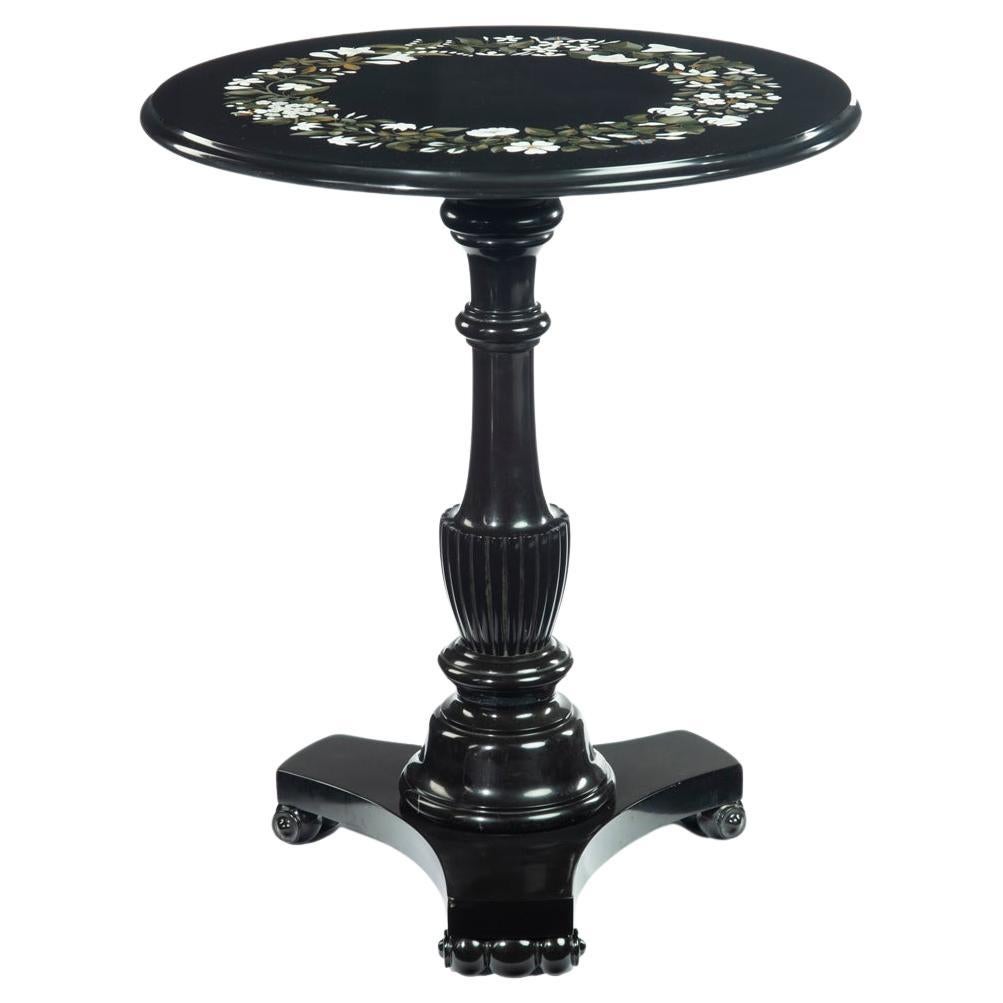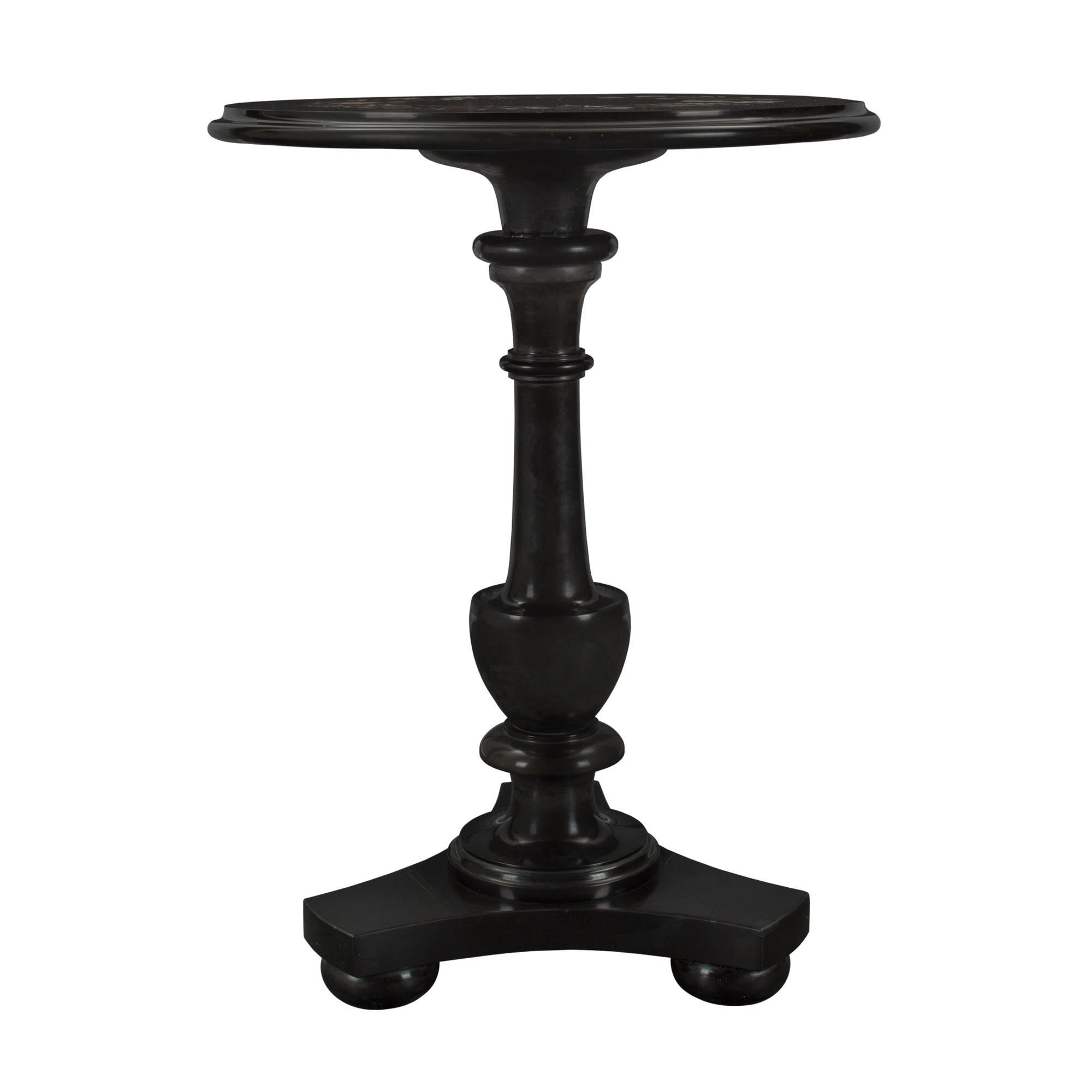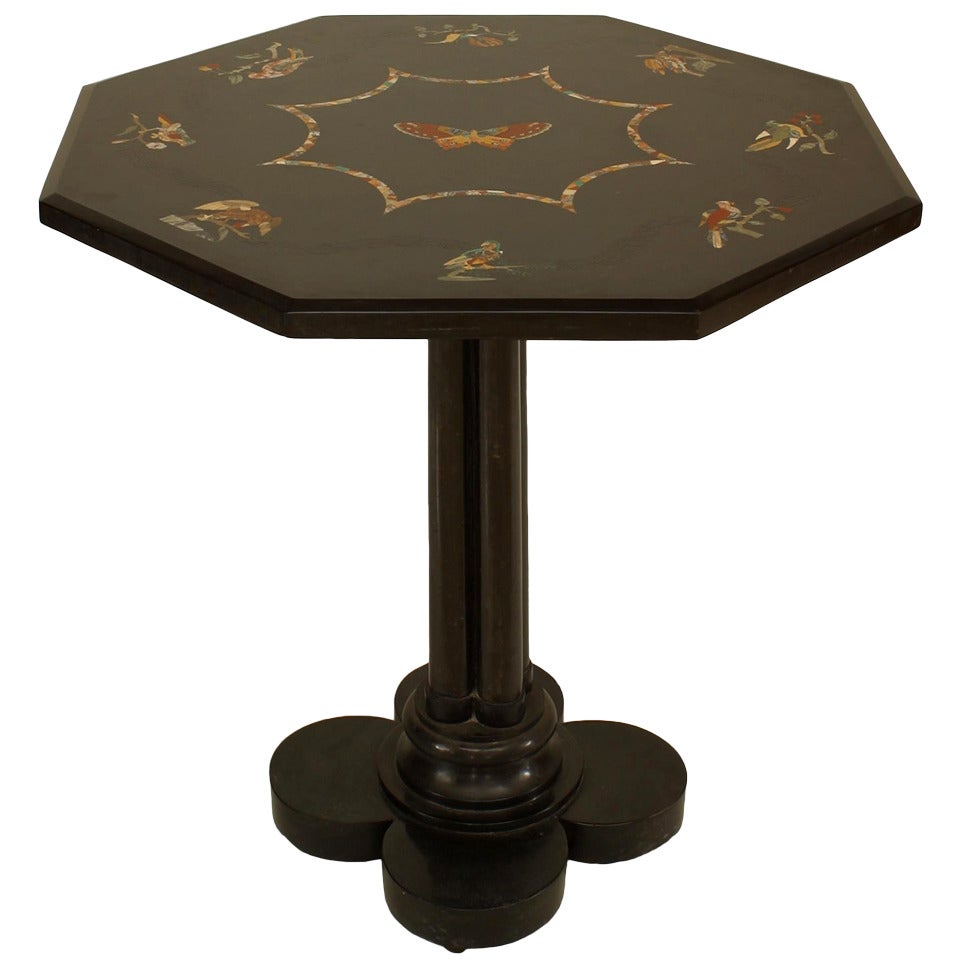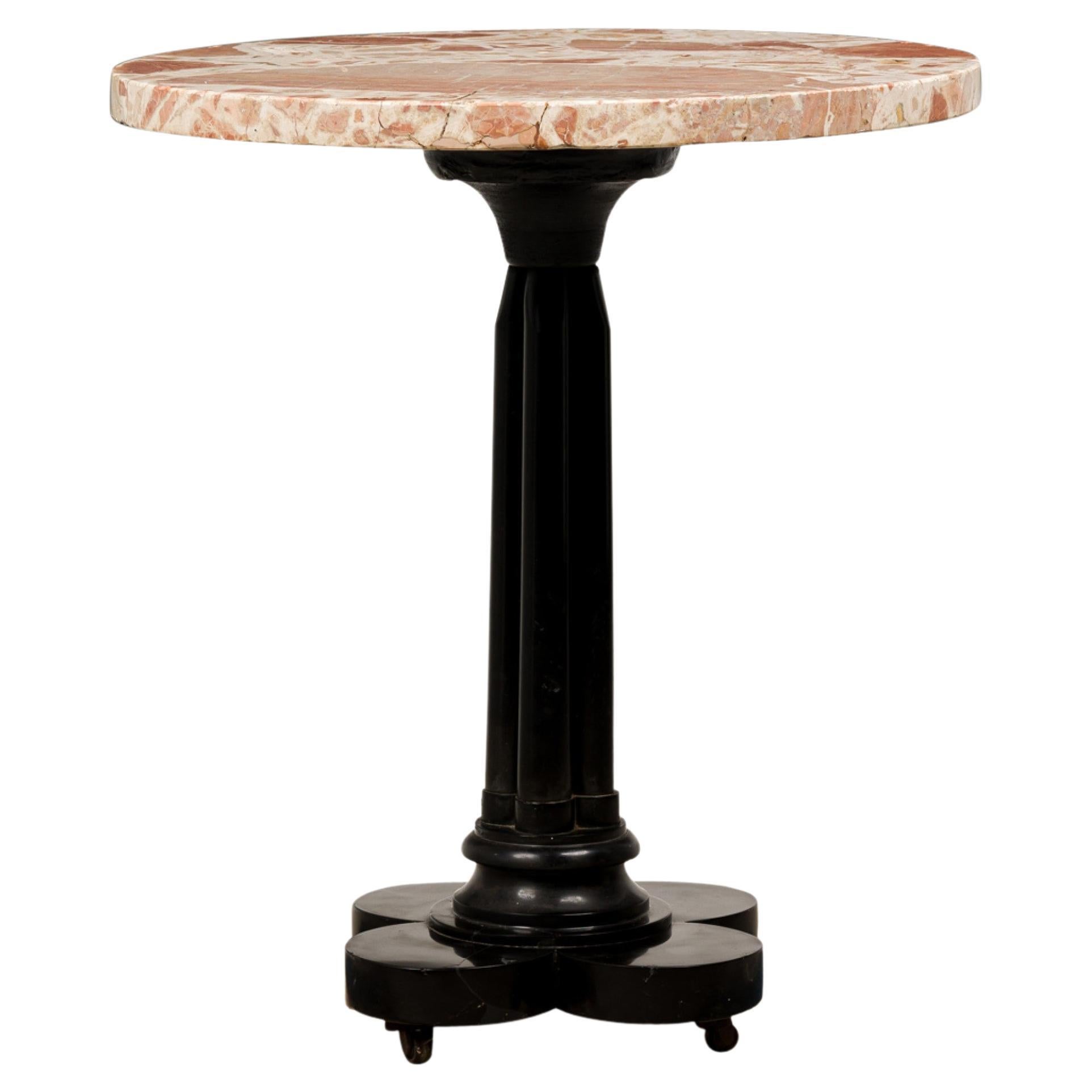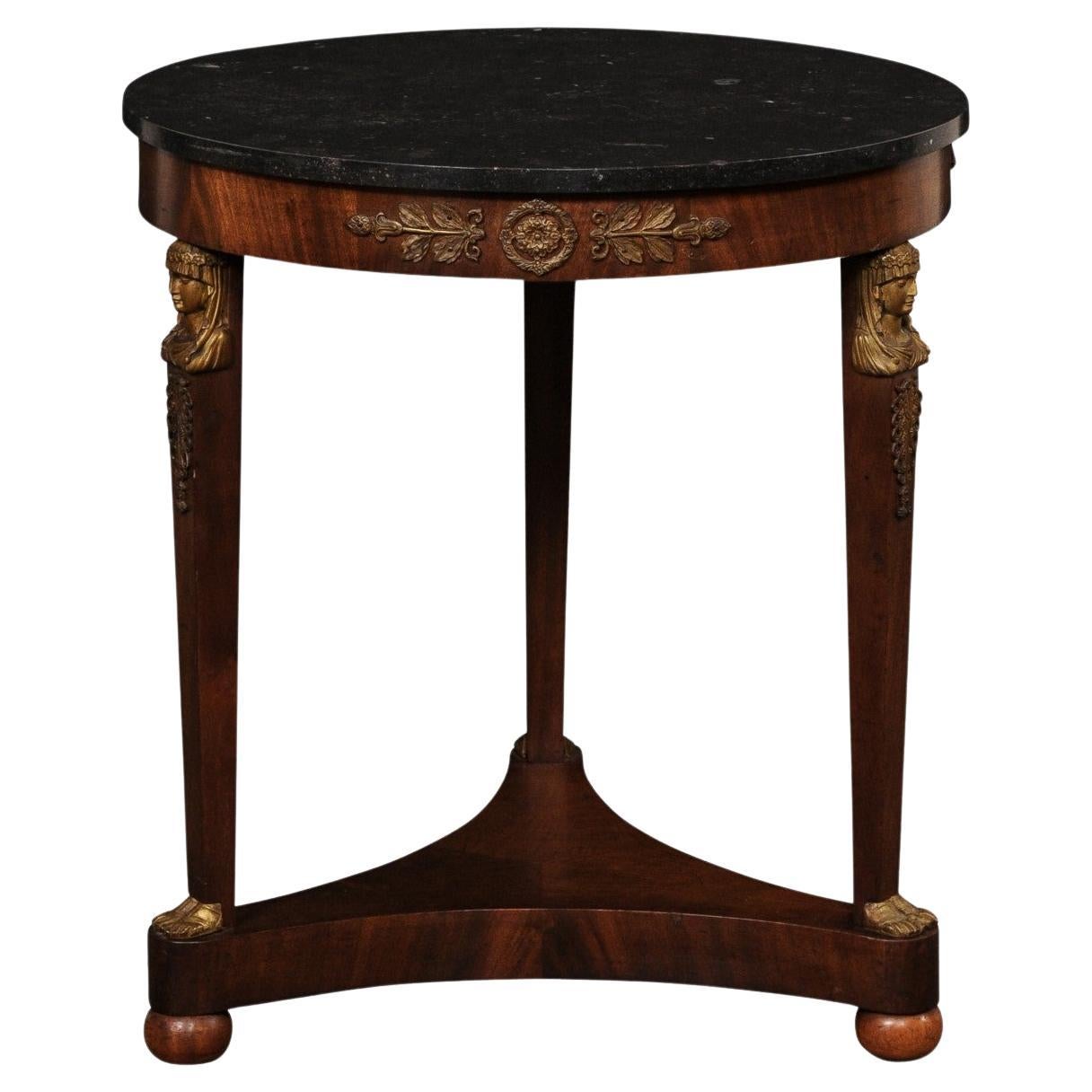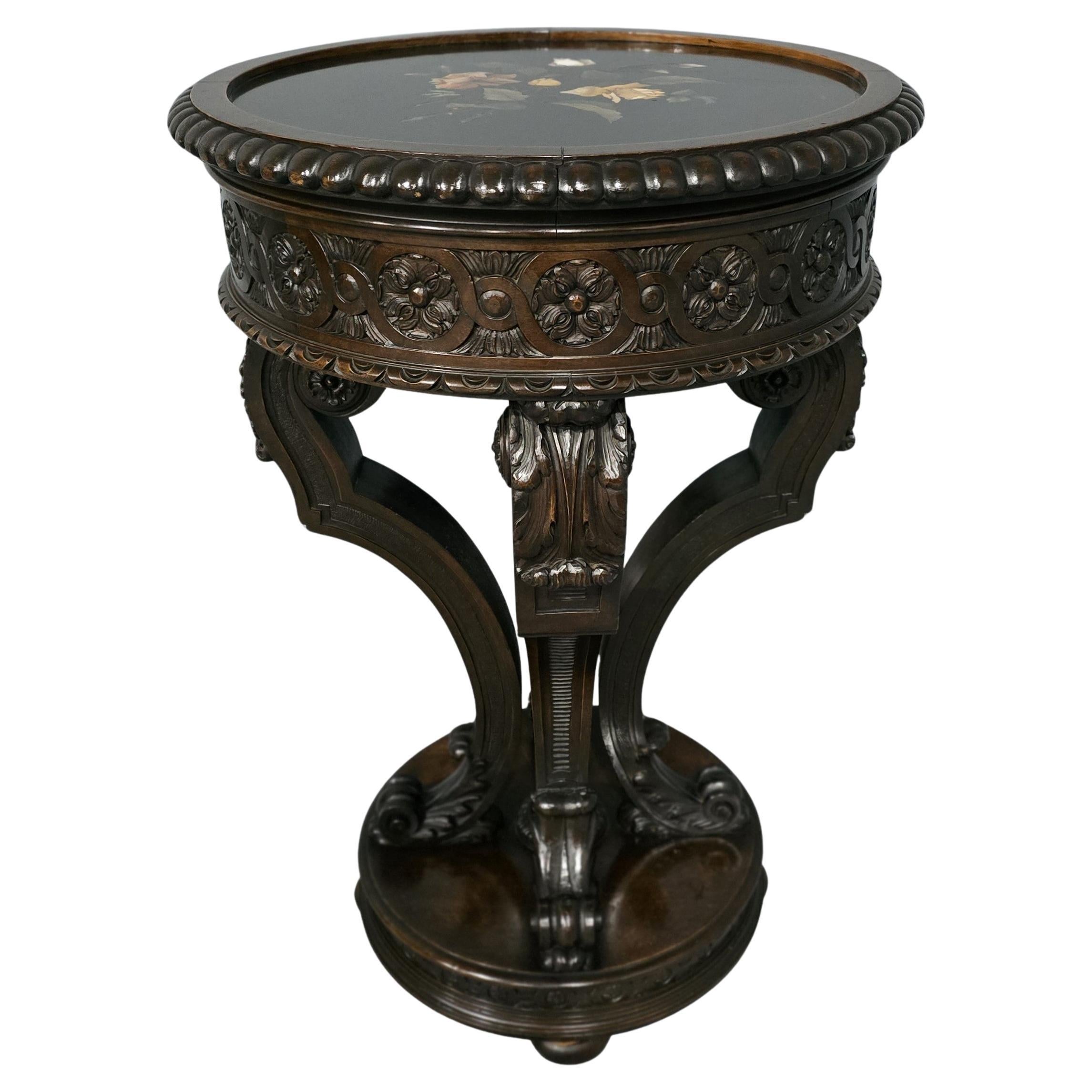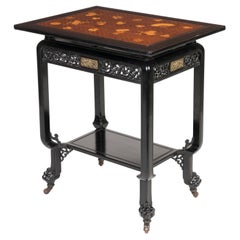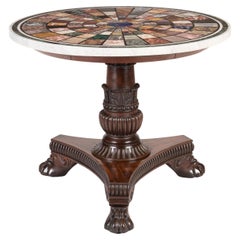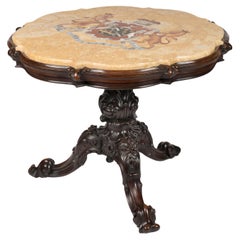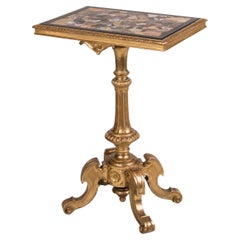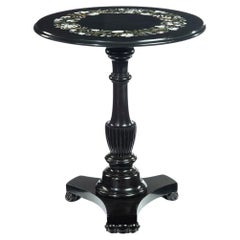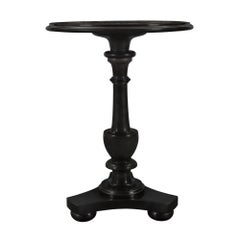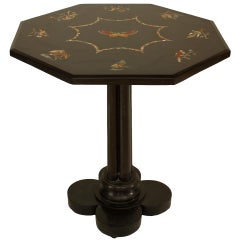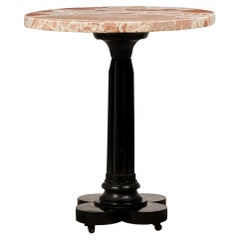Items Similar to 19th Century English Black Marble & Hardstone Inlaid Table by Thomas Woodruff
Want more images or videos?
Request additional images or videos from the seller
1 of 9
19th Century English Black Marble & Hardstone Inlaid Table by Thomas Woodruff
$41,086.62
£30,000
€35,246.32
CA$57,626.04
A$63,200.47
CHF 32,595.13
MX$754,983.08
NOK 413,405.36
SEK 387,821.13
DKK 263,315.93
About the Item
An English Black Marble & Pietra Dura Table
By Thomas Woodruff
'Inlayer to the Queen'
A superb pedestal table of refined proportions and design, constructed entirely from black Ashford marble, the circular top inlaid with a floral wreath executed in specimen stones, representing white roses, lily-of-the-valley, jasmine and even a passion flower with a malachite style, among green foliage. The tripartite based with oblate bun feet, the platform supporting the gadrooned, bulbous and baluster shaped pedestal. Bearing the original plaque under the top 'Manufactured by T. Woodruff / Inlayer / to the / Queen / Buxton.'
English, circa 1860
Woodruff's pieces are highly prized by collectors and museums, with his signed works being particularly valuable.
Dimensions: H: 25 in / 63.5 cm Dia: 30.5 in / 77 cm
Thomas Woodruff (1818-1903)
Thomas Woodruff was a master craftsman who revolutionized the art of working with Ashford Black Marble, a rare limestone from Derbyshire that, when polished, produced an extraordinarily deep, glossy black surface. Beginning his career as a marble mason in Bakewell in 1842, he later moved to Buxton where he expanded his business to include the sale of minerals and fossils, adopting the unique title of 'petrifactioner.'
Woodruff's breakthrough came at the Great Exhibition of 1851, where his commissioned pieces for Prince Albert reportedly surpassed the work of Italian masters. This royal connection, along with Queen Victoria's patronage, led to soaring demand for his work. He became known for his incredibly realistic inlay designs using various materials including Blue John, Siena Marble, and Florentine Green Marble, earning the title 'inlayer to the Queen.'
His work is characterized by exceptional attention to detail, particularly in his naturalistic designs that appeared almost three-dimensional, leading J.M. Tomlinson to describe him as 'the inlayer who brought the art to the highest perfection.'
- Creator:Thomas Woodruff 1 (Maker)
- Dimensions:Height: 25 in (63.5 cm)Diameter: 30.5 in (77.47 cm)
- Materials and Techniques:Marble,Inlay
- Place of Origin:England
- Period:19th Century
- Date of Manufacture:circa 1860
- Condition:Wear consistent with age and use.
- Seller Location:London, GB
- Reference Number:Seller: 98451stDibs: LU954745890062
About the Seller
5.0
Recognized Seller
These prestigious sellers are industry leaders and represent the highest echelon for item quality and design.
Established in 1964
1stDibs seller since 2012
54 sales on 1stDibs
Typical response time: <1 hour
Associations
The British Antique Dealers' AssociationLAPADA - The Association of Arts & Antiques Dealers
- ShippingRetrieving quote...Shipping from: London, United Kingdom
- Return Policy
Authenticity Guarantee
In the unlikely event there’s an issue with an item’s authenticity, contact us within 1 year for a full refund. DetailsMoney-Back Guarantee
If your item is not as described, is damaged in transit, or does not arrive, contact us within 7 days for a full refund. Details24-Hour Cancellation
You have a 24-hour grace period in which to reconsider your purchase, with no questions asked.Vetted Professional Sellers
Our world-class sellers must adhere to strict standards for service and quality, maintaining the integrity of our listings.Price-Match Guarantee
If you find that a seller listed the same item for a lower price elsewhere, we’ll match it.Trusted Global Delivery
Our best-in-class carrier network provides specialized shipping options worldwide, including custom delivery.More From This Seller
View All19th Century French Ebonised Table in the Japonisme Style attributed to Viardot
By Gabriel Viardot
Located in London, GB
An Exquisite Ebonised Table
In the Japonisme Manner
Attributed to G. Viardot
Designed in the exotic style associated with the French 'japonisme' movement and the English Aesthetic m...
Category
Antique 19th Century French Japonisme Side Tables
Materials
Wood, Boxwood
19th Century 'Grand Tour' Marble Top Table with Base attributed to Trotter
By William Trotter
Located in London, GB
An Impressive 'Grand Tour' Specimen Marble Top Centre Table
The base attributed to William Trotter of Edinburgh
Constructed in a finely patinated mahogany, with a Florentine Pietra ...
Category
Antique 19th Century Italian Grand Tour Center Tables
Materials
Agate, Lapis Lazuli, Malachite, Marble, Breccia Marble, Porphyry
19th Century Irish Table with Marble-Inlaid Top having Aristocratic Coat of Arms
By Robert Strahan, J. Darmanin & Sons
Located in London, GB
The Specimen Pietra Dura Marble Armorial Top
By Joseph Darmanin of Malta
The shaped circular top finely inlaid with the arms of General Robert Edward King, 1st Viscount Lorton (1773-1854), masterfully executed in pietra dura and specimen marbles upon a fossil-rich yellow marble ground. The inlaid work is of exceptional delicacy, having all the hallmarks of the greatest heraldic tops by the famous makers, including the use of delicate shaded marbles.
The richly carved base, unmistakably Irish in conception and executed in dense, darkly patinated mahogany, is by Strahan of Dublin, one of the foremost cabinetmakers of his day. The double C-scrolled tripartite base enriched with carved flowers leading to the acanthus clasped pedestal support, on brass hidden castors.
The frame stamped 'Strahan' and retaining its original paper label from Strahan's Henry Street workshop. The underside of the marble top equally bearing its original trade label of 'J. Darmanin & Sons […] Malt.'
The base, Irish, circa 1835
The top, Maltese, circa 1830
Provenance
Commissioned by General Robert Edward King, 1st Viscount Lorton
Originally housed in the Billiard Room at Rockingham House, Co. Roscommon
By descent through the King-Harman family
Lady Dunn
Thence by descent
Private Collection, UK
Dimensions: H: 29 in / 74 cm Dia: 38 in / 97 cm
This table was most likely acquired by Lord Lorton on one of his Grand Tours-either in 1825 or 1836-aligning with Darmanin's transition to "& Sons." The Irish base, dated slightly later, suggests the top was mounted upon return, a common practice for souvenirs of elite European travel. The table remained at Rockingham House until its mid-20th-century demolition, a rare survivor from what was once considered John Nash's finest classical house in Ireland.
J. Darmanin & Sons of Malta
The renowned 'Marble Workers Darmanin' were Malta's leading marble craftsmen in the 19th century. They excelled in creating 'Monumental and Mosaic Slabs and other Decorative Artworks,' notably mosaic table tops...
Category
Antique 19th Century Irish William IV Center Tables
Materials
Marble
19th Century Italian Pietra Dura Hardstone and Giltwood Table
Located in London, GB
An Italian Pietra Dura top occasional table
Constructed in carved gilt wood, having an unusual pietra dura inlaid rectangular platform; the table's legs terminating in scrolls, wi...
Category
Antique 19th Century Italian Grand Tour Side Tables
Materials
Onyx, Marble, Carrara Marble, Porphyry
English Giltwood and Floral Inlaid Stone Occasional Table
Located in London, GB
An occasional table in the Louis XVIth manner
Constructed in giltwood, with a hardstone inlaid top; of circular form, rising from circular toupie feet, the conforming legs conjoin...
Category
Antique 19th Century British Louis XVI Tables
Materials
Precious Stone, Giltwood
19th Century Coromandel and Inlaid Table Attributed to Jackson & Graham
By Jackson & Graham
Located in London, GB
A magnificent library table
Attributed to Jackson & Graham
Of free standing rectangular form, constructed in coromandel, with inlays in thuya, ebony, boxwood, and honeysuckle; the fluted legs rising from square brass castor-shod feet; the frieze housing two lockable drawers fitted with rare ‘tamper proof’ Chubb locks and having quadrant moulded cedar lined interiors; the platform having a central panel of beautifully chosen matched coromandel veneers, with an outer guard border of a running pattern of stylised anthemions; the ebony edges having a thumb nail moulding,
circa 1865
The firm of Jackson & Graham established in 1836 by Thomas Jackson and Peter Graham at 37 Oxford Street London, and for the next fifty years produced predominately high quality furniture and represented Britain at many of the international exhibitions. Their clients included Queen Victoria, Napoleon III, the Grand Khedive of Cairo and the royal palace in Siam. They were particularly noted for their fine marquetry work, the use of Wedgwood plaques, rare woods, and fine casting of bronze mounts. They engaged the leading designers of the period, inter alia, Owen Jones, Bruce Talbert, Alfred Lorimer and Eugene Prignot. In the mid-1850s the workforce was recorded as 250, and by 1875, the company was employing 600 workers. They were feted exhibitors at many of the Great Exhibitions of the 19th century, and frequent prize winners. At the Paris International Exhibition of 1878, the furniture jury noted of them ‘ the workmanship is so perfect that even with the aid of a magnifying glass scarcely the slightest imperfection is to be found’. In 1885 the company was absorbed by Collinson and Lock, who continued their standard of excellence.
Charles Chubb was apprenticed as a blacksmith before starting business as a ships’ ironmonger in Winchester. Jeremiah soon joined the business, and by 1818 the brothers had branched out into lockmaking, founding the famous Chubb Company.
The business really got started when Jeremiah Chubb patented his new ‘detector lock’ in 1818. The lock was constructed so that if someone tried to pick it or open it with the wrong key it became inoperable. To make the lock work again the owner had to use a special key supplied with the lock. The aim of the detector lock was to prevent burglaries, and to warn the owner that someone had tried to break into their property.
The lock soon became popular, and sales of the Chubbs’ products increased even more when they won a government competition to design a lock that could only be opened using its own key. After the invention of the detector lock, the Chubbs decided to move to Wolverhampton, which already had an established lock making industry. By 1838 they were making 28,000 locks a year at their Wolverhampton factory. Another product was added to the Chubb range in 1835 when a patent was taken out for a burglar resistant safe, and in 1837 the Chubb safe...
Category
Antique 19th Century English Tables
Materials
Brass
You May Also Like
A circular Derbyshire Black Marble pietra dura table, attributed to Tomlinson
Located in Lymington, Hampshire
A circular Derbyshire Black Marble pietra dura table, attributed to Tomlinson. the circular top is inlaid in pietra dura with three deli...
Category
Antique 1850s English Tables
Materials
Marble
Italian 19th Century Black Belgium Marble and Pietra Dura Side Table
Located in West Palm Beach, FL
A striking Italian 19th century Black Belgian marble and Pietra Dura side table. The table is raised by a triangular base with concave sides and...
Category
Antique 19th Century Italian Side Tables
Materials
Belgian Black Marble
French Victorian Black Marble Floral End Table
Located in Queens, NY
French Victorian black marble pedestal base end table with floral and bird inlaid octagonal top.
Category
Antique 19th Century French Victorian End Tables
Materials
Marble
French Victorian Black Marble Floral End Table
Located in Queens, NY
French Victorian end table with a black marble 4-column pedestal over a clover leaf base (on casters) all supporting a round brown and white striated marble top
Condition: Good; Wea...
Category
Antique Late 19th Century French Victorian Side Tables
Materials
Marble
French Period Neoclassical Guéridon Table w/Black Marble Top & Revival Accents
Located in Atlanta, GA
A French Neoclassical round-shaped occasional, table with black marble top and revival accents, from the early 19th century. This antique guéridon style table from France features a round-shaped marble top, over the rounded apron that is embellished with wreath and florals. The table is raised upon a tripod base, with a lower stretchered shelf or platform adding support and function between them, while resting atop ball carved feet. Each of the three legs are comprised of Roman column-style posts with female busts at top and feet anchoring the bottom. Please note that there is a chip in the marble. This early 19th century French guéridon will make a beautiful Neoclassic accent table...
Category
Antique Early 19th Century French Neoclassical Center Tables
Materials
Marble
Victorian Marble Pietra Dura Table
Located in Swadlincote, GB
A superb Victorian mahogany centre table, possible Italian, with a wonderful pietra dura marble top depicting roses, excellent original condition.
Category
Antique 19th Century Italian Baroque Tables
Materials
Belgian Black Marble
More Ways To Browse
Antique Prince Albert
Ashford Marble
Ashford Black Marble
Cycling Posters
Double Decker
Fiber Wall Hanging
Flower Wall Sculptures
Folk Art Carved Horse
French Harp
French Neoclassical Prints
Gallery 7
German Film Poster
German Portraits 19th Century
Glass Artichoke
Hand Painted Ewer
Iznik Pottery
Marble Top Bar
Metal Jug
